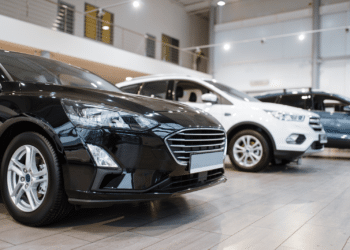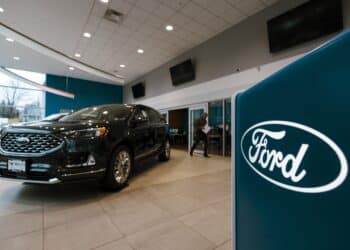Former Tesla Exec Maps Strategies for New Venture With Startup Fair
Shared services are gaining momentum, as the opportunity for mobility outweighs consumers’ desire for ownership, Diarmuid O’Connell, chief strategy officer for subscription service Fair, told Auto Finance News.
Formerly vice president of business development for Tesla Inc., O’Connell was one of the company’s longest-serving executives before his departure in October 2017. He was instrumental in growing the OEM from a classic startup to a globally renowned company worth billions of dollars.

Besides managing Tesla’s commercial and OEM relationships, O’Connell negotiated strategic deals, led efforts on global public policy, and served as interim head of communications. Prior to Tesla, he was chief of staff for the Bureau of Political Military Affairs at the U.S. State Department.
AFN spoke with O’Connell about why he joined Fair, how he intends to expand the company through its partnerships with Uber Technologies Inc. and Ally Financial, and how he plans to leverage the lessons he has learned from working in the electric vehicle space.
Auto Finance News: What is your most significant focus as chief strategy officer of Fair?
Diarmuid O’Connell: We have a massive opportunity with the partnership we’ve got with Uber. We took over Uber’s Xchange Leasing portfolio, and we are cleaning it up and managing it in a very active fashion — that’s No. 1. No. 2 is how do we take advantage of the Uber relationship to serve Uber drivers? How do we put the right cars in the right people’s hands so that they can start their businesses and they can serve their clients well? As we expand on the Uber relationship, how do we set the table for the Fair business to expand nationally into the other core markets?
AFN: Car subscription services are gaining popularity, especially with OEMs developing their programs. What makes Fair’s leasing program stand out against the competition?
DO: There’s a major difference because OEMs’ subscription services are focused on new cars, and we’re about the used-car market. We love the subscription model because it’s a validation of the concept of a new way to access mobility. Individual needs are pouring in that requirement. So I regard the competition as a strategic validation, but something that serves as a fundamental difference is the markets we are targeting — new versus used.
AFN: How did the partnership with Ally Financial Inc. originate?
DO: We found each other. Fundamentally, we were flattered by Ally’s interest — they are an established player in the space — and they have exceptional relationships in the dealer channel and have got a great track record with the consumer channel. Fair represents a complementary offering. The partnership with Ally is a testament to the credibility of Fair relative to the many other startups that you hear about. The leading player in the space chose to approach Fair and validate what we are doing. But now it’s on us to build a relationship and to build the credibility with our Ally partner that gives us assets that are now available to us.
AFN: One of the problems with Uber’s former financing program was the burden of getting sick and not being able to drive, but still having a weekly car payment. Are you expecting a lot of users will come in and out of the program as events like this happen?
DO: We have a duty to our shareholders and investors to manage the business responsibly, but we also have a responsibility to an Uber driver who has an unexpected event in their life, and we don’t want to leave them high and dry. We’re actively working to address that balance. To date, I have not heard of an event such as this in the business, but I love this question because it highlights preventing something that we need to continue to focus on because we want to develop. This whole concept does not work if we don’t deliver on one of the core values of the Fair proposition, which is flexibility.
AFN: What lessons did you take from your experience at Tesla, and how do you plan to apply those to Fair?
DO: The problem I needed to understand was being in an economy where we were overly dependent on a natural resource — oil — that we did not control nor control the pricing. At Tesla, we realized we needed to develop technology that reduces our dependence on oil. I joined Fair because, given my work at Tesla, I saw a number of things happening. Some major themes are going on in this industry — No.1 is electric mobility, and the others are autonomy, connectivity, and the emergence of shared services, which means the opportunity for consumers to buy mobility rather than metal. That may be one of the strongest of the four aspects I just outlined, and Fair is on that trajectory. One of the fundamental things that stick out on the way to that future is that — even in a world of 100% shared services, people are not buying their cars. Someone still needs to own the vehicles, and Fair is one of the most creative and compelling answers to that question. It puts the power in the consumers’ hands, answers the question of who is going to own and manage the asset if it’s not the individual household.
AFN: How was the transition from the EV market to the subscription market?
DO: Over the course of my career, I liked working on new-to-the-world ideas that serve a compelling market interest. I essentially retired following my time at Tesla, but what Fair put together was such a compelling business idea. Great ideas only come by every once in a while, and when they do, you are foolish if you don’t take the opportunity. It’s time to take this thing to the next level — which is why I am here. I’m opting to do with Fair what I did at Tesla, which is the scaling of great ideas and great technology into a widespread movement.
















